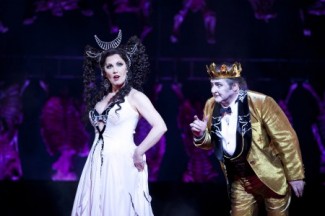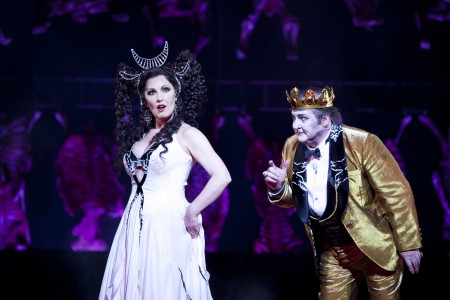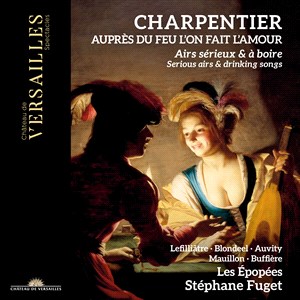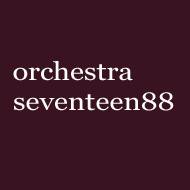Salome reviewed

Gale Edwards directs a thoughtful and refreshing take on the eponymously titled opera by Richard Strauss, which opened in Sydney last week. The narrative is beautifully integrated with Julie Lynch’s costumes, Brian Thomson’s set designs and Kelley Abbey’s choreography. The production is supremely well presented by the ensemble of singers led by Cheryl Barker as Salome, John Wegner as Jokanaan, John Pickering as Herod, Jacqui Dark as Herodias, David Corcoran as Narraboth and Sian Pendry as The Page. Johannes Fritzsch conducts a large orchestra that plays the programmatic score with a range of colours that match the sinister tones of the set and strident costumes. Together, production team, singers, conductor and orchestra create a sense of foreboding and horror that could hardly be called entertainment – if not for the pleasure of hearing the superb musical performances, the engagement with dramatic demands and the witty take on the Dance of the Seven Veils.
Cheryl Barker sings the demanding vocal and dramatic role with aplomb and a convincing physicality. Jokanaan is powerfully portrayed by John Wegner. John Pickering is a suitably decadent and lily-livered Herod and Jacqui Dark sublimates her instincts as a new parent to play the mother from hell. The supporting characters declare themselves silently but convincingly in the early scenes despite being in semi-darkness upstage. The dark undertones give way to a brief radiance as Jokanaan rises from the cistern like a repressed conscience coming to the fore, with his message of redemption.
Salome alternately teases and rejects the ascetic . Unmoved by her attempts at seduction, Jokanaan’s rejection of Salome turns the ingenue into a predator – a pivotal moment in the drama. Unaccustomed to not getting her own way, Salome performs ‘The Dance” for her stepfather Herod, much to the horror of her mother Herodias, and wins from Herod any wish she desires. That wish is the head of Jokanaan – not because he condemned the marriage of Herodias to Herod, the brother of her dead husband as incestuous, but because she wanted to kiss his lips. The final scenes in which Salome, a woman possessed, toys lustily with her decaying trophy, are memorable.
Mercifully, Edwards has not exploited ‘The Dance’ as an excuse for a gratuitous display of flesh – unless one considers the slaughterhouse array of animal carcasses splayed at the back of the stage and the ghoulish representation of the head of Jokanaan. Rather, Salome performs her seductive piece de resistance in the guise of seven personifications of women through time.
Salome premiered in Dresden in 1905, earning 38 curtain calls. Strauss based it very closely on Oscar Wilde’s (1854-1900) play about the biblical character. It was embraced by opera houses across Europe, despite being banned in Vienna which dashed Mahler’s hopes of conducting it, and disapproval from moralists in England and the USA. Strauss conducted the first Austrian and Italian performances, banished to the lesser Austrian and Italian cities of Graz and Turin, and Toscanini premiered it at La Scala in 1906.
Salome is first mentioned, but not named in the New Testament, as the daughter of Herodias. Her initial persona would have been vested with early Christian perceptions of her as an individual and as a woman. Her next manifestation relating to the opera is in Oscar Wilde’s play of 1891. (Salome appears in a play by Flaubert, Herodias published in 1877 and upon which Massenet based his opera Herodiade which premiered in 1881). It’s not possible to know to what extent Wilde was influenced by these characterisations, but he can’t have been immune from them. He also had his own sexual conflicts to deal with. Wilde’s and indeed Strauss’ perceptions of Salome must surely have been overlaid by the zeitgeist of Sigmund Freud (1856 – 1939) with the his Three Essays on the Theory of Sexuality, published in the same year of the opera’s premiere, and his Interpretation of Dreams preceding it in 1899.
Finally, there is the layer to Salome’s portrayal added by this production team and cast.
All in all, a frightfully good evening at the opera.
Shamistha de Soysa for Sounds Like Sydney©
Other reviews at:
http://www.smh.com.au/entertainment/opera/review/stage/salome-20121014-27ksc.html
Salome is playing in the Opera Theatre of the Sydney Opera House on selected evenings at 7.30 pm until October 31st; Matinee on November 3rd at 1 pm.
Tickets: From $70
OA Box office: (02) 9318 8200 or visit www.opera-australia.org.au







